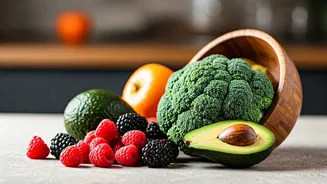Fiber's Crucial Role
Fiber, an indigestible carbohydrate, is vital for digestive health. It acts as the primary food source for beneficial gut bacteria, influencing the gut microbiome's
composition and function. Fiber aids in regulating bowel movements, preventing constipation and reducing the risk of conditions like diverticulitis. Adequate fiber intake can also promote a feeling of fullness, supporting weight management efforts. Furthermore, fiber has been linked to lower risks of heart disease, type 2 diabetes, and certain cancers. The type of fiber consumed matters, as soluble fiber dissolves in water and can help lower cholesterol levels, while insoluble fiber adds bulk to stool, facilitating easier passage through the digestive system. A diet rich in both types of fiber is essential for optimal gut health and overall well-being. Focusing on fiber-rich foods ensures a balanced and supportive environment for the gut microbiome.
Beans and Legumes
Beans and legumes are nutritional powerhouses, particularly high in fiber. Lentils, chickpeas, black beans, and kidney beans are excellent sources of both soluble and insoluble fiber. Incorporating these foods into your diet can significantly boost your fiber intake and contribute to improved gut health. Beyond fiber, they provide essential nutrients like protein, iron, and folate. Beans and legumes also have a low glycemic index, which means they cause a slower and more gradual rise in blood sugar levels, making them beneficial for individuals with diabetes. Regular consumption of beans and legumes is associated with a reduced risk of chronic diseases. They can be easily integrated into various meals, from soups and stews to salads and side dishes, making them a versatile and healthy dietary addition.
Whole Grains' Benefits
Whole grains are another excellent source of fiber, offering both soluble and insoluble varieties. Options like oats, brown rice, quinoa, and whole-wheat bread provide substantial amounts of fiber, promoting healthy digestion. The fiber in whole grains contributes to regular bowel movements and can help prevent constipation. These grains are also rich in vitamins, minerals, and antioxidants, contributing to overall health. Compared to refined grains, whole grains have a slower impact on blood sugar levels, helping to stabilize energy and potentially reducing the risk of type 2 diabetes. Choosing whole grains over refined ones can improve gut health and provides added health benefits. Start by swapping refined grains for whole-grain alternatives in your daily meals.
Fruits and Vegetables
Fruits and vegetables are essential for a fiber-rich diet, offering a wide array of options to improve gut health. Apples, berries, pears, broccoli, Brussels sprouts, and carrots are especially high in fiber. They provide a combination of soluble and insoluble fiber that supports digestive regularity and promotes the growth of beneficial gut bacteria. Additionally, fruits and vegetables are packed with vitamins, minerals, and antioxidants, contributing to overall health and protecting against chronic diseases. The diversity of fruits and vegetables allows for varied fiber intake, which is good for your gut microbiome. Aim to include a variety of colors in your diet to ensure a comprehensive nutrient intake. Eating seasonal produce can also provide the freshest and most nutrient-rich options. Fruits and vegetables are versatile foods that you can easily add to your breakfast, lunch, or dinner.
Nuts and Seeds
Nuts and seeds are great for gut health because they provide a healthy dose of fiber along with essential nutrients. Almonds, chia seeds, flaxseeds, and walnuts are particularly rich in fiber and contribute to a well-balanced diet. Fiber from nuts and seeds supports regular bowel movements and can aid in preventing constipation. They also contain healthy fats, protein, vitamins, and minerals that promote overall health. Incorporating nuts and seeds into your diet can help improve gut health and provide additional health benefits. They can be eaten as a snack, added to smoothies, or sprinkled on salads and meals. Consuming a small handful of nuts or seeds each day can make a positive impact on your fiber intake and digestive health. Choose raw, unsalted varieties to maximize their nutritional benefits.












